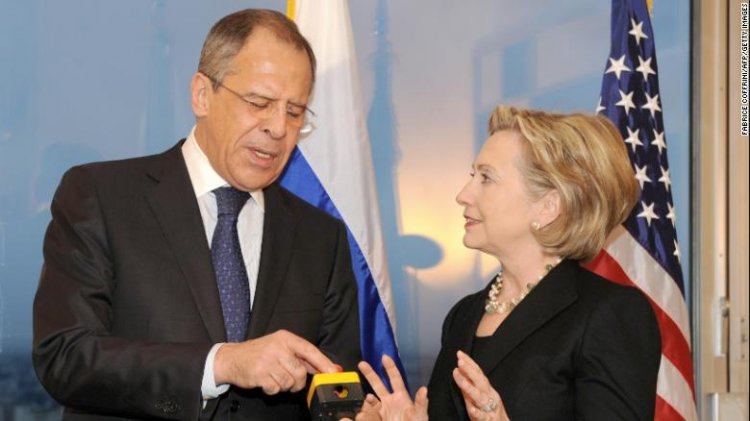Why did the West take so long to notice Putin's atrocities?
As Clinton handed Lavrov a red button, the world's attention was drawn to the funny fact that Americans had misspelled "reset" in Russian, which made Lavrov giggle. The region, on the other hand, gasped for air: everyone who has lived under Russian rule knows that what thrilled Lavrov the most was that Moscow got away with murder.

Ukraine's horrific, world-changing conflict did not begin in 2022. It didn't start in 2014, either. It all started when Russia invaded Georgia and got away with it a decade and a half ago.
When the first Russian bombs hit Kyiv, a friend texted, "Remember the red button?" Everyone remembers the red "reset" button in the region that has been subjugated and tormented by Russia for centuries: Hillary Clinton's gift of an illusory fresh start to Russian Foreign Minister Sergey Lavrov during their meeting in Geneva in 2009.
The invasion of Georgia's capital, Tbilisi, had been averted by then, but the country's sovereignty had been severely harmed by Russia's occupation of 20% of its territory. The government of Georgia, America's closest non-NATO ally in the region, warned of a new hybrid war. However, the US was keen to move on after the pain of Bush's foreign escapades.
As Clinton handed Lavrov a red button, the world's attention was drawn to the funny fact that Americans had misspelled "reset" in Russian, which made Lavrov giggle. The region, on the other hand, gasped for air: everyone who has lived under Russian rule knows that what thrilled Lavrov the most was that Moscow got away with murder.
It would happen again and again over the next 14 years. Many of us, including myself, did not believe Putin would conduct such a large-scale attack against Ukraine. Millions of people, including Ukrainians, Moldovans, Georgians, Syrians, Armenians, and Azeris, have all taken part in dress rehearsals for the Kremlin's latest horror show. And we all know it didn't have to be this way.
Putin's strategy for rebuilding his empire has always been primitive. The ostensible adversaries were always a downtrodden population and a US-backed "fascist" regime.
Putin, on the other hand, changed the play after each rehearsal. Putin's army had filthy boots and rusted tanks when they invaded Georgia in 2008, but it was there that he first tested his now-famous cyber strikes. He got away with it.
For years, Western media portrayed Ukraine as a country "at war with itself." But it never was. It was bewildering to me that after all these years, even before this latest, and possibly fatal for him, invasion, the debate in the West focused on rights and wrongs of the NATO enlargement and not the fact that a sovereign country has the right to choose its own path.
Dima, the soldier, was like every other Ukrainian you've seen on your screen: stoic, determined, and composed. He was a 23-year-old Kyiv-based software engineer who had only lately quit his job to join the struggle. He told me that his partner was unhappy with him, but that fighting was not an option.
"They believe we are striving for NATO membership."
They now do. The entire universe has suddenly become morally clear. This show of Western unity and the return of liberal ideals comes as a huge comfort to everyone who has lived on the frontlines of Putin's disdain for liberal democracy. But it won't last unless we acknowledge that for far too many people, it's already too late.
It's too late for Dima, who was murdered in battle in eastern Ukraine a year after we spoke and long before Europeans realized he was fighting for them.

 Boakyewaa Lawrencia
Boakyewaa Lawrencia 



































